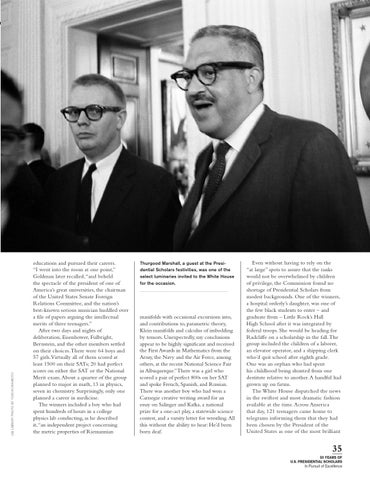LBJ LIBRARY PHOTO BY YOICHI OKAMOTO
educations and pursued their careers. “I went into the room at one point,” Goldman later recalled, “and beheld the spectacle of the president of one of America’s great universities, the chairman of the United States Senate Foreign Relations Committee, and the nation’s best-known serious musician huddled over a file of papers arguing the intellectual merits of three teenagers.” After two days and nights of deliberation, Eisenhower, Fulbright, Bernstein, and the other members settled on their choices. There were 64 boys and 57 girls.Virtually all of them scored at least 1500 on their SATs; 20 had perfect scores on either the SAT or the National Merit exam. About a quarter of the group planned to major in math, 13 in physics, seven in chemistry. Surprisingly, only one planned a career in medicine. The winners included a boy who had spent hundreds of hours in a college physics lab conducting, as he described it, “an independent project concerning the metric properties of Riemannian
Thurgood Marshall, a guest at the Presidential Scholars festivities, was one of the select luminaries invited to the White House for the occasion.
manifolds with occasional excursions into, and contributions to, parametric theory, Klein manifolds and calculus of imbedding by tensors. Unexpectedly, my conclusions appear to be highly significant and received the First Awards in Mathematics from the Army, the Navy and the Air Force, among others, at the recent National Science Fair in Albuquerque.” There was a girl who scored a pair of perfect 800s on her SAT and spoke French, Spanish, and Russian. There was another boy who had won a Carnegie creative writing award for an essay on Salinger and Kafka, a national prize for a one-act play, a statewide science contest, and a varsity letter for wrestling. All this without the ability to hear: He’d been born deaf.
Even without having to rely on the “at large” spots to assure that the ranks would not be overwhelmed by children of privilege, the Commission found no shortage of Presidential Scholars from modest backgrounds. One of the winners, a hospital orderly’s daughter, was one of the few black students to enter – and graduate from – Little Rock’s Hall High School after it was integrated by federal troops. She would be heading for Radcliffe on a scholarship in the fall. The group included the children of a laborer, an elevator operator, and a shipping clerk who’d quit school after eighth grade. One was an orphan who had spent his childhood being shunted from one destitute relative to another. A handful had grown up on farms. The White House dispatched the news in the swiftest and most dramatic fashion available at the time. Across America that day, 121 teenagers came home to telegrams informing them that they had been chosen by the President of the United States as one of the most brilliant
35 50 YEARS OF U.S. PRESIDENTIAL SCHOLARS
In Pursuit of Excellence
